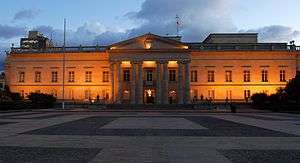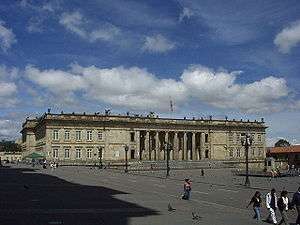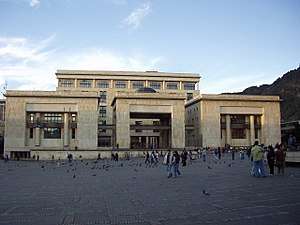Politics of Colombia
The Politics of Colombia take place in a framework of a presidential representative democratic republic, whereby the President of Colombia is both head of state and head of government, and of a multi-party system. Executive power is carried out by the government. Legislative power is vested in both the government and the two chambers of congress, the Senate and the House of Representatives of Colombia. The Judiciary is independent of the executive and the legislature.
 |
|---|
| This article is part of a series on the politics and government of Colombia |
|
Constitution |
|
Legislature |
|
Executive
|
|
|
Major political parties
|
|
Related topics
|
|
|
The Economist Intelligence Unit rated Colombia a "flawed democracy" in 2019.[1] [2]
Constitutional reforms
Colombia's present constitution, enacted on July 5, 1991, strengthened the administration of justice with the provision for introduction of an adversarial system which ultimately is to entirely replace the existing Napoleonic Code. Other significant reforms[3] under the new constitution provide for civil divorce, dual nationality, the election of a vice president, and the election of departmental governors. The constitution expanded citizens' basic rights, including that of "tutela," under which an immediate court action can be requested by an individual if he or she feels that their constitutional rights are being violated and if there is no other legal recourse.
The national government has separate executive, legislative, and judicial branches.
Executive branch

The president is elected for a single four-year term. Between 2005 and 2015, the president could be re-elected for a second term. The 1991 constitution reestablished the position of vice president, who is elected on the same ticket as the president. By law, the vice president will succeed in the event of the president's resignation, illness, or death.
Legislative branch
Colombia's bicameral Congress consists of a 108-member Senate of Colombia and a 172-member Chamber of Representatives of Colombia. Senators are elected on the basis of a nationwide ballot, while representatives are elected in multi member districts co-located within the 32 national departments. The country's capital is a separate capital district and elects its own representatives. Members may be re-elected indefinitely, and, in contrast to the previous system, there are no alternate congressmen. Congress meets twice a year, and the president has the power to call it into special session when needed.
Political parties and elections
2018 Presidential election
| Candidate | Party/alliance | First round | Second round | |||
|---|---|---|---|---|---|---|
| Votes | % | Votes | % | |||
| Iván Duque Márquez | Grand Alliance for Colombia | 7,569,693 | 39.14 | 10,373,080 | 53.98 | |
| Gustavo Petro | List of Decency | 4,851,254 | 25.09 | 8,034,189 | 41.81 | |
| Sergio Fajardo | Colombia Coalition | 4,589,696 | 23.73 | |||
| Germán Vargas Lleras | Mejor Vargas Lleras | 1,407,840 | 7.28 | |||
| Humberto De la Calle | PLC–ASI | 399,180 | 2.06 | |||
| Jorge Antonio Trujillo | We Are All Colombia | 75,614 | 0.39 | |||
| Promotores Voto En Blanco | Party of Ethnic Reclamation "PRE" | 60,312 | 0.31 | |||
| Viviane Morales Hoyos | Somos Región Colombia | 41,458 | 0.21 | |||
| Blank votes | 341,087 | 1.76 | 808,104 | 4.21 | ||
| Invalid votes | 300,080 | – | 295,499 | – | ||
| Total | 19,336,134 | 100 | 19,510,684 | 100 | ||
| Registered voters/turnout | 36,227,267 | 53.37 | 36,783,940 | 53.04 | ||
| Source: El Tiempo Government | ||||||
2018 Parliamentary election
House of Representatives
| Party | Votes | % | Seats |
|---|---|---|---|
| Colombian Liberal Party | 2,471,596 | 13.82% | 35 |
| Democratic Center | 2,388,405 | 13.36% | 32 |
| Radical Change | 2,140,630 | 11.97% | 30 |
| Social Party of National Unity | 1,840,481 | 10.29% | 25 |
| Colombian Conservative Party | 1,819,867 | 10.18% | 21 |
| Green Alliance | 884,146 | 4.94% | 9 |
| Independent Movement of Absolute Renovation | 585,638 | 3.27% | 1 |
| Alternative Democratic Pole | 444,912 | 2.49% | 2 |
| Citizen Option | 310,724 | 1.74% | 2 |
| List of Decency Coalition (ASI–UP–MAIS) | 262,282 | 1.47% | 2 |
| Partido Somos | 160,618 | 0.90% | 0 |
| Colombia Coalition | 121,338 | 0.68% | 0 |
| Colombia Justa Libres | 114,174 | 0.64% | 1 |
| Indigenous Social Alliance Movement | 112,340 | 0.63% | 0 |
| Alternative Santandereana Coalition | 71,953 | 0.40% | 1 |
| Alternative Indigenous and Social Movement | 44,034 | 0.25% | 1 |
| Colombia Justa Libres | 58,654 | 0.33% | 0 |
| List of Decency Coalition (ASI–UP–MAIS) | 49,426 | 0.28% | 0 |
| Patriotic Union | 42,910 | 0.28% | 0 |
| Citizen Force for Decency | 35,140 | 0.20% | 0 |
| Common Alternative Revolutionary Force (FARC) | 32,636 | 0.18% | 0 |
| AV–PDA | 21,849 | 0.12% | 0 |
| Coalition for the North | 17,935 | 0.10% | 0 |
| Todos Somos Colombia | 16,447 | 0.09% | 0 |
| Indigenous Authorities of Colombia | 11,244 | 0.06% | 0 |
| Arauca for All | 5,028 | 0.03% | 0 |
| Movement for Regional Integration | 3,033 | 0.02% | 0 |
| Afro-Colombian Seats | |||
| C.C. Ancenstral de Comunidades Negras Playa Renaciente | 32,439 | 0.18% | 1 |
| Consejo Comunitario La Mamuncia | 23,627 | 0.13% | 1 |
| C.C. de la Comunidad Negra de la Plata Bahía Málaga | 17,006 | 0.10% | 0 |
| Consejo Comunitario del Rio Yurumangui | 13,355 | 0.07% | 0 |
| Consejo Comunitario Mayor de Certegui | 11,743 | 0.07% | 0 |
| C.C. De Comun. Negras Palenque Vda. Las Trescientas y Mun. Galapa | 11,655 | 0.07% | 0 |
| Fundación Laborar por Colombia Fundalabor | 8,035 | 0.04% | 0 |
| Fundación Esperanza Afro-Esafro | 7,933 | 0.04% | 0 |
| Consejo Comunitario de Alejandro Duran Diaz | 7,828 | 0.04% | 0 |
| Todos Somos Colombia | 7,287 | 0.04% | 0 |
| Corporación Poder Ciudadano | 6,597 | 0.04% | 0 |
| Consejo Comunitario Renacer Negro | 6,346 | 0.04% | 0 |
| Si Se Puede | 5,904 | 0.03% | 0 |
| Consejo Comunitario Bocas del Atrato y Leoncito | 3,919 | 0.02% | 0 |
| Consejo Comunitario Ma Kankamana de San Basilio de Palenque | 3,795 | 0.02% | 0 |
| C.C. de la Comunidad Negra de la Calle Larga Rio Dagua | 3,527 | 0.02% | 0 |
| C.C. de los Corregimientos de San Antonio y El Castillo | 3,292 | 0.02% | 0 |
| Consejo Comunitario Los Andes | 3,220 | 0.02% | 0 |
| Consejo Comunitario Veredas Unidas Un Bien Común | 3,194 | 0.02% | 0 |
| ACN-EAT | 2,991 | 0.02% | 0 |
| C.C. De La Comun. Negra De Tierra Baja Mi Territorio Ancestral | 2,980 | 0.02% | 0 |
| Consejo Comunitario Imbilpi del Carmen | 2,451 | 0.01% | 0 |
| Consejo Comunitario de la Comunidad Negra de Limones | 2,403 | 0.01% | 0 |
| AFROSANPEDRO | 2,329 | 0.01% | 0 |
| FUNAFROPECOR | 2,193 | 0.01% | 0 |
| Consejo Comunitario Tablon Salado | 2,134 | 0.01% | 0 |
| AFROCODES | 1,988 | 0.01% | 0 |
| Asociación Colombia Negra Huellas de Africania en Paz | 1,915 | 0.01% | 0 |
| Kusuto Magende Cokumalu de Luruaco | 1,905 | 0.01% | 0 |
| Consejo Comunitario de las Baras | 1,873 | 0.01% | 0 |
| Fundación Amor y Paz | 1,691 | 0.01% | 0 |
| Consejo Comunitario de Comunidades Negras Obatala | 1,634 | 0.01% | 0 |
| CENAFROZ | 1,628 | 0.01% | 0 |
| Cuenca del Rio Iscuande | 1,557 | 0.01% | 0 |
| Consejo Comunitario de Comunidades Negras Santo Domingo | 1,554 | 0.01% | 0 |
| Org. Social de Comunidades Negras "Nelson Mandela" | 1,533 | 0.01% | 0 |
| FUNETCOL | 1,509 | 0.01% | 0 |
| C.C. General del Río Baudó y Sus Afluentes "Acaba" | 1,340 | 0.01% | 0 |
| Los Palenkes | 1,314 | 0.01% | 0 |
| FUNDEVIA | 1,075 | 0.01% | 0 |
| Fundación Renacer Para Todos | 1,010 | 0.01% | 0 |
| Asoc. de Afr. Sin Animo de Lucro de S. Cristóbal Sur Asafroscol 4 | 1,006 | 0.01% | 0 |
| Indigenous Seats | |||
| Alternative Indigenous and Social Movement | 99,645 | 0.56% | 1 |
| Indigenous Authorities of Colombia | 45,969 | 0.26% | 0 |
| UAIZSACOR | 4,437 | 0.02% | 0 |
| ANICOL | 4,308 | 0.02% | 0 |
| Taita Zipa Foundation | 2,442 | 0.01% | 0 |
| Casiyouren Traditional Authority | 1,909 | 0.01% | 0 |
| Invalid/blank votes | 3,433,453 | – | – |
| Total | 17,882,318 | 100 | 166 |
| Registered voters/turnout | 36,493,318 | – | |
| Source: RNEC (99.03% of polling stations reporting) | |||
Senate
| Party | Votes | % | Seats |
|---|---|---|---|
| National Seats | |||
| Democratic Center | 2,513,320 | 17.36 | 19 |
| Radical Change | 2,155,487 | 14.89 | 16 |
| Colombian Conservative Party | 1,927,320 | 13.32 | 15 |
| Colombian Liberal Party | 1,901,933 | 13.14 | 14 |
| Social Party of National Unity | 1,853,054 | 12.80 | 14 |
| Green Alliance | 1,317,429 | 9.10 | 10 |
| Alternative Democratic Pole | 736,367 | 5.09 | 5 |
| List of Decency Coalition (ASI–UP–MAIS) | 523,286 | 3.62 | 4 |
| Independent Movement of Absolute Renovation | 501,489 | 3.46 | 3 |
| Colombia Justa Libres | 431,418 | 2.98 | 0 |
| Citizen Option | 354,042 | 2.45 | 0 |
| Partido Somos | 94,349 | 0.65 | 0 |
| Todos Somos Colombia | 63,443 | 0.44 | 0 |
| Common Alternative Revolutionary Force (FARC) | 52,532 | 0.36 | 0 |
| Union for Fortaleza | 34,121 | 0.24 | 0 |
| Si Se Puede | 14,860 | 0.10 | 0 |
| Indigenous Seats | |||
| Alternative Indigenous and Social Movement | 72,591 | 45.68 | 1 |
| Indigenous Authorities of Colombia | 34,957 | 22.00 | 1 |
| Indigenous Social Alliance Movement | 23,742 | 14.94 | 0 |
| Political Sovereignty Movement | 15,692 | 9.87 | 0 |
| Casiyouren Traditional Authority | 5,370 | 3.38 | 0 |
| Ethnic Renovation of Colombia | 4,382 | 2.76 | 0 |
| Indigenous Environmental Movement | 2,181 | 1.37 | 0 |
| Invalid/blank votes | 3,184,820 | – | – |
| Total | 17,818,185 | 100 | 102 |
| Registered voters/turnout | 36,493,318 | 48.82 | – |
| Source: Colombia.com (98.97% of polling stations reporting) | |||
Judicial branch
The civilian judiciary is a separate and independent branch of government. Guidelines and the general structure for Colombia's administration of justice are set out in Law 270 of March 7, 1996. Colombia's legal system has recently begun to incorporate some elements of an oral, accusatory system. The judicial branch's general structure is composed of four distinct jurisdictions (ordinary, administrative, constitutional, and special). Colombia's highest judicial organs are the Supreme Court, the Council of State, the Constitutional Court, and the Superior Judicial Council. Although all the high courts technically oversee separate jurisdictions, the Constitutional Court has a broad spectrum of judicial oversight which often allows it to rule on issues overseen by different jurisdictions and even weigh in directly in the rulings of other high courts.[4]
International organization participation
Global
Other
References
- The Economist Intelligence Unit (8 January 2019). "Democracy Index 2019". Economist Intelligence Unit. Retrieved 13 January 2019.
- wola (2020-05-04). "Illegal Surveillance by Colombia's Military is Unacceptable". WOLA. Retrieved 2020-05-10.
- Bruce M. Wilson, "Institutional Reform and Rights Revolutions in Latin America: The Cases of Costa Rica and Colombia", Journal of Politics in Latin America, ISSN 1868-4890
- Botero Marino, Botero Marino; Fernando Jaramillo. "El Conflicto de las Cortes Colombianas en Torno a la Tutela Contra Sentencias" (PDF). Retrieved 5 October 2015.
External links
- House of Representatives of Colombia
- Senate of Colombia
- Presidency of Colombia
- Supreme Court of Justice of Colombia


.svg.png)